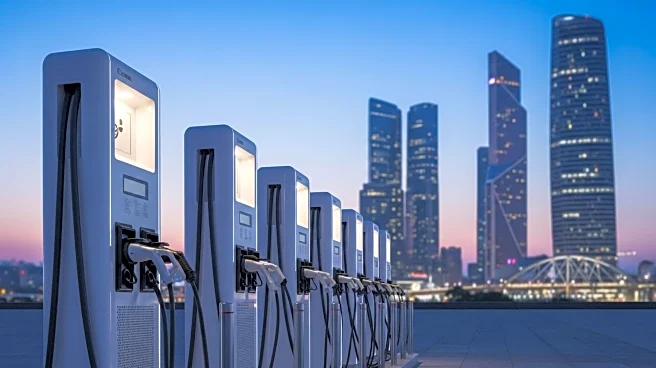What's Happening?
Volkswagen Group of America reported a significant 231% year-over-year increase in electric vehicle (EV) sales for the third quarter of 2025. This growth was largely driven by the strong performance of the ID Polo model. The surge in Volkswagen's EV sales is part of a broader trend within the automotive industry, where several brands have experienced substantial increases in their EV sales. Audi, a subsidiary of Volkswagen, also saw a 232% rise in EV sales during the same period. Despite the expiration of the EV tax credit, the market for electric vehicles remains robust, indicating a growing consumer interest and acceptance of EVs.
Why It's Important?
The substantial growth in Volkswagen's EV sales highlights the increasing consumer shift towards electric vehicles, driven by environmental concerns and advancements in EV technology. This trend is significant for the U.S. automotive industry as it indicates a potential shift in market dynamics, with traditional internal combustion engine vehicles possibly losing market share to EVs. The growth also suggests that despite the expiration of tax incentives, consumer demand for EVs remains strong, which could encourage further investment and innovation in the sector. Automakers that successfully capitalize on this trend may gain a competitive edge in the evolving automotive landscape.
What's Next?
As the EV market continues to expand, automakers are likely to increase their focus on developing new models and improving existing ones to capture a larger share of the market. Volkswagen and other manufacturers may also explore strategies to enhance consumer awareness and acceptance of EVs, potentially through marketing campaigns or partnerships. Additionally, the industry may see increased competition as more brands enter the EV space, driving further innovation and potentially leading to more affordable and efficient electric vehicles for consumers.
Beyond the Headlines
The growth in EV sales could have broader implications for environmental policy and infrastructure development in the U.S. As more consumers adopt electric vehicles, there may be increased pressure on policymakers to invest in charging infrastructure and renewable energy sources to support the growing number of EVs on the road. This shift could also influence regulatory frameworks and encourage the development of more sustainable transportation solutions, contributing to national and global efforts to reduce carbon emissions.









